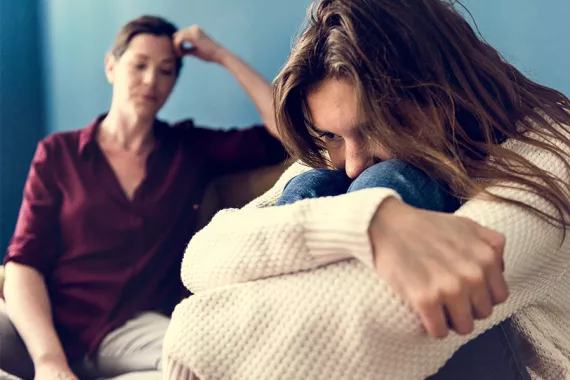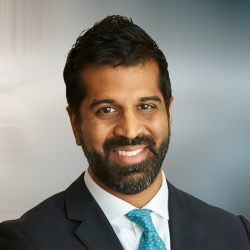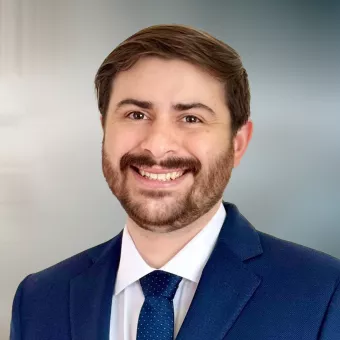
The Legal Team
- Andrew P. Arnold
- Esther E. Berezofsky
- Ebony Williams Bobbitt
- Riley Breakell
- Abigail Burman
- Jessica L. Carroll
- Grace P. Chandler
- Jessica C. Colombo
- Sara O. Couch
- Nelson L. Drake
- Jodi Westbrook Flowers
- Jade A. Haileselassie
- Mathew P. Jasinski
- Marlon E. Kimpson
- Annie E. Kouba
- Tope O. Leyimu
- Paul T. Lyons
- Kate E. Menard
- Donald A. Migliori
- Lance Oliver
- Jonathan D. Orent
- Joseph F. Rice
- Tammy Cauley Rivers
- Previn Warren
Case Overview
Research suggests a strong connection between social media use and various mental health issues, including anxiety. The widespread use of social media platforms may contribute to the growing mental health crisis among young people, in particular. Below, we examine the potential link between social media and anxiety in teens and adolescents.
Key takeaways about the link between social media and anxiety
- Social media use has been linked to anxiety, depression and body image concerns in adolescents.
- Studies show that teens who spend more than three hours daily on social media are at significantly higher risk for mental health challenges.
- Lawsuits claim that social media companies have long been aware of the mental health risks they pose to young users but have failed to protect these users.
Does social media cause anxiety?
Studies and government reports have raised serious concerns about the connection between social media use and anxiety. The 2025 U.S. Surgeon General’s Advisory on Social Media and Youth Mental Health warns that adolescents who have more than three hours of social media screen time each day face a notably heightened risk of mental health problems, including anxiety and depression. Nearly half of teens from age 13 to age 17 report that social media negatively affects their body image.
The National Institutes of Health (NIH) also studies the complex relationship between social media and mental health, noting that while social media offers social support, it also potentially exposes users to negative experiences, such as bullying and harassment. These experiences can significantly increase anxiety, particularly for vulnerable youth.
Does social media increase anxiety?
Based on the available research, it is possible that the factors that may cause anxiety for some people may increase existing anxiety for others. It is also possible that the anxiety caused by social media may worsen with continued use, given the links between heavy usage of social media and anxiety.
Why does social media cause anxiety?
Several aspects of social media use can contribute to anxiety in young people. From cyberbullying to the pressure that comes with constant social comparison, different aspects of social media can create or exacerbate anxiety symptoms. Let’s take a closer look at some of the most common contributors.
Cyberbullying
Cyberbullying is a growing concern on social media platforms, with research linking it to increased rates of anxiety and depression in adolescents. Unlike traditional bullying, cyberbullying is persistent and can happen at any time, often leaving victims feeling isolated and vulnerable. The design of social media platforms may encourage harassment by amplifying harmful content, allowing anonymous interactions and failing to enforce effective moderation.
Fear of missing out (FOMO)
Fear of missing out (FOMO) is a significant driver of social media-induced anxiety. Social media platforms encourage users to post and elevate idealized versions of themselves, potentially causing some adolescents who see these posts to have lower self-esteem, or feel excluded or inadequate. The apps also encourage frequent engagement through features like Snapstreaks and TikTok Now, which can make these feelings worse.
Sleep disruption
Use of social media, particularly at night, can disrupt sleep patterns by way of blue light exposure that interferes with the body’s natural production of melatonin. Poor sleep quality is directly associated with increased anxiety and other mental health issues. Adolescents who spend more time on social media are more likely to report sleep disturbances.
Notifications
Social media apps may have incessant notifications that ping users about what their peers are doing and urge kids to engage with the platforms. These notifications may make social media stressful for users.
However, these notifications aren’t always consistent. Apps may withhold notifying users about interactions with their posts for a period of time to further maximize user engagement.
Social comparison
Social comparison is a well-documented contributor to anxiety. Social media encourages users to compare their lives to idealized representations of others. Adolescents, more so than other groups, may feel inadequate when measuring their appearance, achievements, or social standing against those of their peers.
Symptoms of anxiety from social media
Anxiety related to social media can manifest through various emotional, behavioral and physical symptoms. Adolescents are exceedingly vulnerable, with symptoms often affecting their daily lives and well-being.
- Emotional symptoms: Persistent worry, fear, irritability and feelings of inadequacy
- Behavioral symptoms: Avoidance of social situations, decreased participation in activities, and compulsive social media use
- Physical symptoms: Headaches, fatigue, poor sleep quality and gastrointestinal issues
When left unaddressed, these symptoms can interfere with academic performance, relationships and overall quality of life.
Resources for people struggling with anxiety
- If you need help or a loved one needs help, national resources are available.
- Call 988 or visit 988lifeline.org to connect with the Suicide & Crisis Lifeline. This resource is free, confidential and available 24/7.
- Call 1-800-950-6264 to connect with the National Alliance on Mental Illness (NAMI), with chapters in all 50 states.
What did companies allegedly know about anxiety and social media?
Companies regularly survey users to see how to improve their products and how teens and young adults react to them. Publicly available, external research also showcases the potential harms of social media platforms and features.
Leaks of internal research show that social media companies are aware of their impact on the mental health of their users. They know that the mental health of kids and adolescents is in danger from the use of their products.
Below is some information about what these companies know about how social media can cause anxiety.
Meta
Meta, the parent company of Facebook and Instagram, has been at the center of social media harm allegations. Internal documents show that the company knew its platforms negatively affected the mental health of teens, particularly adolescent girls.
Research suggests that the social comparison aspect of Instagram could compound feelings of anxiety and depression among teens. One slide discussing internal user research said: “Teens blame Instagram for increases in the rate of anxiety and depression. This reaction was unprompted and consistent across all groups.”
Despite Meta having this awareness, many social media skeptics say Meta prioritizes engagement and growth over addressing users’ concerns. As a result, millions of young users may be susceptible to suffering mental health harms.
Snapchat
Snapchat’s design, focused on short-lived content and addictive features, has also been linked to anxiety in young users. These features include:
- Snapstreaks: External research has found that young users who lose a Snapstreak often experience negative feelings. A 2018 internal study by Snap found that more than a third of users found it important to keep a Snapstreak going, and they felt an enormous amount of pressure to do so.
- Snap Map: Snap Map is a feature of Snapchat that, unless disabled, shares a person’s location with their friends and the public. Beyond the concern of sharing the locations of minors, researchers have also found that the feature promotes feelings of jealousy, which can lead to anxiety and sadness.
Reports claim that Snapchat knew its platform could foster compulsive behaviors and increase anxiety among adolescents. Critics assert that the company failed to introduce adequate mental health protections, all while recognizing these risks.
TikTok
TikTok has faced criticism for its potential role in exacerbating anxiety among adolescents. Studies indicate the platform’s algorithm can expose young users to potentially harmful content, including material related to mental health issues. A recent report highlighted concerns that TikTok may expose teens to content in connection with suicide and eating disorders, potentially leading to increased anxiety and distress.
YouTube
YouTube has also been scrutinized for its perceived impact on adolescent mental health, particularly the role it seems to play in this age group’s anxiety. Research indicates that the platform’s recommendation algorithms can lead users, especially teenagers, to content not suitable for their age — potentially increasing their anxiety and stress levels. Experts have raised concerns that YouTube’s design may contribute to a mental health crisis among young users by exposing them to distressing content without providing adequate safeguards.
Individuals file social media lawsuits for anxiety and other harms
Hundreds of individuals have filed lawsuits against major social media companies, accusing the platforms of causing or worsening serious mental health conditions – including anxiety, depression and suicidal ideation. These claims are largely made by or on behalf of young people who used social media during critical developmental years and experienced significant mental health challenges then or later in life.
These claims have been consolidated into multidistrict litigation (MDL), which contains lawsuits seeking to hold social media companies accountable for personal injuries and even wrongful death. These injuries are linked to social media platform design and alleged social media company negligence in the form of failure to protect users from foreseeable harm.
According to the plaintiff’s master complaint for the federal court cases, social media companies knowingly designed their platforms to maximize engagement. The complaint further asserts that social media companies use addictive features, such as algorithmically driven endless feeds and variable rewards to manipulate users into compulsive behavior. Plaintiffs argue that companies failed to adequately warn users about the risks of heavy social media use, especially for adolescents who are more susceptible to being influenced because their brains are still developing.
School districts file social media harm lawsuits
Across the United States, numerous school districts have also filed lawsuits against major social media companies. These cases claim these companies’ platforms have contributed to a growing mental health crisis among students. The complaints focus on what users say are the addictive and harmful design features of social media platforms. School districts argue that social media platforms have made a severely negative impact on student behavior and well-being in the following ways:
- Addictive platform designs: Social media companies are accused of designing features to maximize user engagement, leading to compulsive use.
- A rise in student mental health issues: Schools report increased cases of anxiety, depression and other mental health challenges among students.
- Disruption of classroom environments: Teachers have observed reduced attention spans, classroom disruptions and even violent outbursts related to social media use.
- Strain on school resources: Schools have been forced to expand their counseling services and create new educational programs to address social media addiction.
Lawsuits filed by school districts are part of the broader federal MDL.
Our experience helping families stand against tech companies
Motley Rice attorneys have worked for decades fighting for families and people. Our experience includes representing people suing tech companies over harm they’ve suffered.
You may be eligible to sue if you believe you or your child experienced the following due to social media:
- Attempted or died by suicide
- Received treatment for self-harm
- Received a diagnosis of a mental health disorder from a healthcare professional
If you believe these conditions were caused or worsened by social media and you need help filing a lawsuit for social media harm, please contact us. Your well-being is important to our team.
Does social media cause anxiety?
Why does social media cause anxiety?
Symptoms of anxiety from social media
What did companies allegedly know about anxiety and social media?
Individuals file social media lawsuits for anxiety and other harms
School districts file social media harm lawsuits
Our experience helping families stand against tech companies
- Sources
- American Psychological Association. The Role of Social Comparison in Adolescent Mental Health.
- Chang AM, Aeschbach D, Duffy JF, Czeisler CA. Evening use of light-emitting eReaders negatively affects sleep, circadian timing, and next-morning alertness. Proc Natl Acad Sci USA. 2015 Jan 27;112(4):1232–7.
- Dunn, T. and Langlais, M., “Oh, Snap!”: A Mixed-Methods Approach to Analyzing the Dark Side of Snapchat. The Journal of Social Media in Society. 2020;9(2):69-104.
- Griffith University News. Impacts of YouTube on Loneliness and Mental Health.
- Hristova D, Jovicic S, Göbl B, De Freitas S, & Slunecko T. “Why did we lose our snapchat streak?”. Social media gamification and metacommunication. Computers in Human Behavior Reports. 2022 Mar 1;5:100172.
- Karim F, Oyewande AA, Abdalla LF, Chaudhry Ehsanullah R, Khan S. Social media use and its connection to mental health: a systematic review. Cureus. 2020 June. 12(6):e8627.
- Lee, JK. The effects of social comparison orientation on psychological well-being in social networking sites: Serial mediation of perceived social support and self-esteem. Curr Psychol. 2022 Sep 1;41(9):6247–59.
- Mayo Clinic. Anxiety disorders
- Muhammad Faisal Farid, Hina Jalal and Sara Iqbal, Relationship between Social Media, General Anxiety Disorder, and Traits of Emotional Intelligence. Bulletin of Education and Research. 2022 April.
- National Institutes of Health. Adolescent Social Media Use and Mental Health Research.
- The Wall Street Journal. The Facebook Files.
- The Wall Street Journal. Facebook Knows Instagram Is Toxic for Teen Girls, Company Documents Show.
- Time. The Anxious Generation: How Social Media Creates a Mental Health Crisis.
- U.S. Department of Health and Human Services. U.S. Surgeon General’s Advisory on Social Media and Youth Mental Health.
Start Your Motley Rice Consultation in Simple Steps
Submit Information
Call us or fill out our online form with the details of your potential case.
Case Review
Our team reviews your information to assess your potential case.
Case Consultation
Talk with us about next steps.


